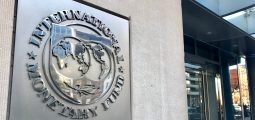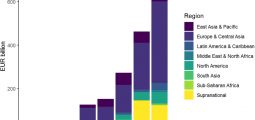PwC Nigeria: Does Size Really Matter? Economic and Fiscal Implications of Nigeria’s Rebased GDP
 Gross Domestic Product (GDP) is an internationally recognised measure of economy size and strength. It is importance to have up-to-date data so the rebasing is a step in the right direction. It is expected to make planning and investment decisions more robust and informed. For example, the performance of the government in revenue collection, capital spending, external debt and budgeting can be benchmarked against similar economies.
Gross Domestic Product (GDP) is an internationally recognised measure of economy size and strength. It is importance to have up-to-date data so the rebasing is a step in the right direction. It is expected to make planning and investment decisions more robust and informed. For example, the performance of the government in revenue collection, capital spending, external debt and budgeting can be benchmarked against similar economies.
Nigeria’s GDP was recently rebased from about USD 270 billion to USD 510 billion for 2013. This increase of about 90% was attributed to new sectors of the economy such as telecommunications, movies, and retail which were previously not captured or underreported. As a result of the rebasing, Nigeria is now the largest country in Africa and 26 largest in the world.
However, Nigeria needs more than GDP rebasing to stimulate the economy. While it is important to have up-to-date statistics, this will not of its own lead to economic prosperity or change the reality on the ground. It is like a farmer who breeds animals but has not properly counted his animals in the past. He has just discovered that he has more than he thought because he previously left out some new species that have now fully developed. Feeling richer than his neighbours, he wants to throw a party to celebrate his new status but a wise man reminds him that he still lives in poverty, unable to pay his children’s school fees and so on. The statistics may have changed but the reality remains the same.
“The general awareness and tax education amongst the populace is also a very important factor that has the potential of shaping the attitude of the public to voluntary tax compliance.”
One obvious arae of underperformance is taxation which is immensely important to national development as a key source of sustainable revenue and an indicator of economic wellbeing. Compared to other sources of revenue, tax revenues can be relatively predictable and governments are able to plan with a greater amount of certainty than when relying majorly on natural resources.
Verifiable Evidence & Undisputed Facts
While some may have doubts about the veracity of the rebased GDP figure, tax revenue offers verifiable evidence and indisputable facts. The tax-to-GDP ratio compares the amount of tax collected to the nominal GDP. Generally the ratio in poor countries is around half of what is obtained in developed nations. According to the Heritage Foundation 2012 data, France had a tax to GDP ratio of 44.6%, Sweden 45.6%, UK 39%, US 27%, Tanzania 12%, Burkina Faso 11.5%, and Nigeria 6.1%.
If we consider all levels of government (federal, states and local councils), Nigeria had about 14.6% for 2013 before the rebasing which is now about 7.8% for the same year. This is based on about NGN 4.8 trillion (about USD 30 billion) collected by the Federal Inland Revenue Service (FIRS), NGN 833.4 billion (about USD 5.2 billion) by the Nigeria Customs Service, and about NGN 648 billion (USD 4 billion) by the states and local councils compared to the rebased GDP of USD 510 billion.
If we isolate the tax revenue from oil, then the tax-to-GDP ratio for the sector will be about 27% while for the non-oil sectors it comes to about 4.6% which is one of the lowest in the world. This is notwithstanding that the tax collection figures above include tax refunds and credits due to taxpayers which should really not be reported as revenue. In addition, there is tax revenue collected from sectors which are not officially included in the GDP calculation such as religious activities and the informal sector.
According to the National Bureau of Statistics (Nigeria), GDP is the market value of all officially recognized final goods and services produced within a country in a given period. With appropriate adjustments therefore, the ratio will fall even further. Perhaps Nigeria needs to rebase her tax revenue generation model.
If Nigeria uses the “output” approach in calculating the GDP, then VAT on goods and services would be the appropriate tax indicator. In the case of “expenditure” approach, the tax indicator should be VAT and import duties while in the case of “income” approach for GDP calculation, personal income tax on wages and withholding tax on rent, interest and dividend should be the corresponding tax indicator. These will help complement the GDP figures for a more informed economic planning.
It is now very clear that the tax revenue generating capacity of the Nigerian economy is yet to be harnessed and that the current tax system is ineffective in many ways. The Minister of Finance, Dr Ngozi Okonjo-Iweala in reaction to the rebased GDP, has given the FIRS a charge to raise collection from taxes. The aim is to get the ratio to at least 20%. This implies a revenue target of about NGN 14 trillion (USD 87.5 billion) up from the current NGN 6 trillion (about USD 37.5 billion) for the FIRS alone. It is important to note that the rebased GDP growth rates for 2011, 2012 and 2013 were 17%, 13% and 13% respectively. To improve the tax revenue to GDP ratio, tax collection must grow faster than GDP.
Resisting the Easy Way
The manner in which the tax authorities will go about this revenue drive will have its effect, positive or negative, on the economy. For instance, it will be counterproductive for the FIRS to focus its revenue drive on the few, easy targets, already compliant group of taxpayers rather than seeking to expand the tax base especially to bring tax evaders into the tax net. The practice of subjecting already compliant taxpayers to unproductive and time consuming audits, which drain resources of both the taxpayers and the tax authorities alike, will not achieve the desired results.
What this will do in effect is to impose unnecessary burdens on the larger and more visible taxpayers while tax evasion particularly in the informal economy continues unabated. This can compromise the competitiveness of tax compliant entities and individuals by overburdening them with never ending audits which in turn discourages potential investors and stifles economic growth.
A pragmatic way to boost the tax-to-GDP ratio is through improvements in the fiscal system. Nigeria’s tax regime is unnecessarily cumbersome and notoriously unfriendly to taxpayers. In the report Paying Taxes 2014 – the latest iteration of an annual study by the World Bank and PwC that compares the ease of paying taxes globally – Nigeria ranks 170 out of 189 economies. Clearly a lot needs to be done to make tax compliance less onerous for the average taxpayer.
In addition, a systematic approach should be adopted in identifying the tax gap and devising a means of bridging it. For instance, a study of the economic activity reported per sector of the rebased GDP in comparison to the amount of tax revenue generated from that sector should be undertaken to determine areas of primary focus for revenue drive. The logic behind this is that with the rebasing of the GDP, the tax authorities also need to consider rebasing their tax net. You may be surprised to see a couple of sectors with negative ratios which is possible if they have been granted more in tax incentives than their contribution by way of tax payment.
With the increase in the automation of processes, increased online transactions leaving electronic trails, the tax authorities have more information to work with which can be used to achieve other objectives of curbing corruption and money laundry.
Measuring Success
Success should not be measured only in terms of more tax revenue generated but also in terms of the ease of compliance, the number of new taxpayers that are brought into the tax net, cost of collection, tax refunds processed, speed of tax audit completion, improvement in voluntary compliance, number of prosecuted tax fraud cases, opportunity cost of waivers/incentives and so on. The general awareness and tax education amongst the populace is also a very important factor that has the potential of shaping the attitude of the public to voluntary tax compliance. Simple rate cards and tax calculation templates as well as a bouquet of all the applicable taxes levied by governments at all levels should also be readily available and accessible to all.
As taxation issues become more prominent in public discussion, companies doing business in Nigeria must be prepared to pay their taxes correctly and on time. Any failing in this regard could have significant reputational damage in addition to the financial penalties.
To increase public confidence and promote a positive taxpaying culture, Nigerian leaders and politicians must lead by example. Relevant agencies must scrutinize the tax records of current and aspiring political office holders in order to break the vicious cycle of tax conspiracy.
About the Author

Mr Taiwo Oyedele is the Head of Tax and Regulatory Services at PwC Nigeria. He is an ardent advocate of tax reforms with particular emphasis on tax simplification and transparency. He runs a blog on tax matters (www.pwc.com/nigeriataxblog).

About PwC
PwC firms help organisations and individuals create the value they’re looking for. PwC is a network of firms in 157 countries employing more than 184,000 people who are committed to delivering quality in assurance, tax and advisory services.
You may have an interest in also reading…
EY Argentina: Argentina’s Promotional Tax System for Knowledge-based Companies is Gaining Ground in the Local Market
After more than two years of the enactment of the “knowledge-based” Law, time has come to ask whether this new
World Bank Supports Greater Resilience to Climate Related Hazards in Mozambique
The World Bank Board of Executive Directors approved today an International Development Association (IDA)* financing in the amount of US$50
Robert Shiller: Making Sense of the Irrationality of Markets
The question of what motivates a trader to buy or sell shares at any particular moment is probably as old




























































































